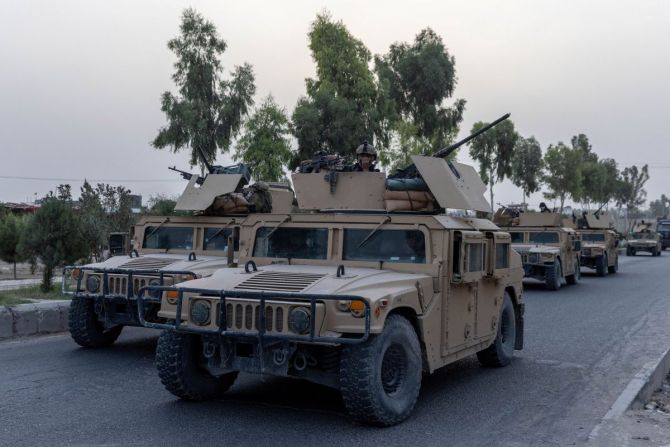The Taliban's rise will see an increase in infiltration on India's western border and terrorist groups in Pakistan will get funding from the Taliban, warns Brigadier Rajamani Kannan (retd).

With US troops pulling out of Afghanistan, the Taliban is asserting itself to take control of large territories in the country.
Will the Afghan government and security forces be able to defend themselves?
The Taliban is likely to take control and stake its claim to establish a government.
Who will support a Taliban government -- Russia? China? India? Initially, possibly only Pakistan.
Russia has already assured Tajikistan that it will help deal with the Taliban. Russia doesn't stand to gain by supporting the Taliban. But Moscow would not like to commit troops on the ground to support the Afghan forces. It may strike with aircraft and missiles, but not put boots on ground having learnt from the US experience.
For that matter, no country will like to put boots on ground. That should be India's stand too.
China would not like to involve itself with the internal affairs of another country, especially to contain the Taliban. Its concern would be to have a stable government in Kabul from whom it can reap the benefits of its investments.
Further, China does lose a lot if the Taliban comes to power since the latter may collude with the Turkistan Islamic Movement in restive Xinjiang and strengthen the extremist Uyghur outfit in Western China.
The Taliban is also likely to fund militant groups in Pakistan and may target Chinese assets in Pakistan. This will seriously affect China's investments in Pakistan too.
Pakistan has been a huge ally of the Taliban much to the chagrin of the international community. But today's Pakistan is different. Its economy is in the doldrums. The more it supports the Taliban, the more international funding will dwindle.
But disowning the Taliban will annoy the latter and may lead to increased insurgent activity within Pakistan which Islamabad can ill afford.
India has always supported the civilian government of Afghanistan and distanced itself from the Taliban.
The Taliban's rise will see an increase in infiltration on India's western border and terrorist groups in Pakistan will get funding from the Taliban. Further, Indian assets in Afghanistan would be get targeted.
Iran was anti-Taliban to start with, but with the American involvement in Afghanistan its enemy's enemy became its friend. With the withdrawal of US troops the only reason Iran will support the Taliban is to secure its border with Afghanistan.
An unstable Afghanistan benefits none. The challenge will be to rein in the Taliban, but will any country put boots on the ground? Fighting the Taliban will have to be done by the Afghan forces who can be provided with external support in terms of intelligence, specific targets etc.
If India doesn't contribute in this effort, it may not be allowed to get a share of its pie in the development of Afghanistan, with China likely to take the lead once the situation stabilises.
Reining in the Taliban will only be possible if all external support and funding to the Taliban is halted and its opium trade is disrupted. While the former can be done by the international community, the latter can best be done by the Afghan government and its security forces.
The international community has to come together to hold the hand of the Afghan government to subdue the Taliban, ask the Taliban to eschew violence while involving it in forming the government.
The Taliban will ensure that it has control over most of Afghanistan before it comes to the negotiating table so that it can stake its claim to form the government.
But will nations be willing to have diplomatic relations with a country being ruled by a terrorist outfit which doesn't respect national or international laws?
Is the international community willing to accept this?
The US will not. The Russians having fought many battles against the Taliban may at best share an unhappy peace.
That leaves China to take the lead. But China will also be conscious of the fact that while a totalitarian government is good for control, a government in the hands of a militant group, not recognised by the UN, will always spell disaster.
Factions within the Taliban may break up for power mongering and result in the 'warlord syndrome' that existed in Afghanistan in the 1990s.
Thus, the international community will have to strengthen the hands of the Afghan government, possibly under a UN mandate firstly to reign in the Taliban and secondly to get the civilian government to be formed with some power sharing with the Taliban, with the condition that it eschews violence and accept national laws and not follow Sharia law.
Feature Presentation: Aslam Hunani/Rediff.com











 © 2025 Rediff.com -
© 2025 Rediff.com -